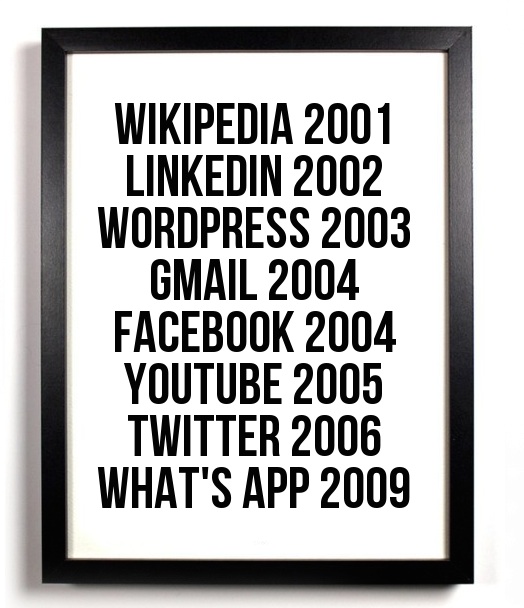|
My first tweet was actually “Test”. I didn’t mean to Tweet. I’d been lurking for quite some time having joined Twitter at the urging of @dominiccampbell who kindly tweeted me back saying “you might want to tweet something more interesting than “test”. So I deleted the first tweet and responded to the next person who messaged me who was @paul_clarke "frightened the life out of myself playing with Nambu and accidentally ended up Twittering! I’ll stay now but be very quiet! 11:47 AM - 19 May 2009 Nambu was an early tool like Hootsuite that I’d been testing but anyway the point is back then I’d actually been lurking since January 2008 so it was a whole 18 months before I actually tweeted anything myself. The reason that I’d not tweeted was because I was working as Director of Communications in Barnet Council in the “command and control” model of communications at local government level so I was happy to lurk and listen at a time when the key message for communication professionals was “you don’t want to BE the story” for fear (God forbid) I might say something unprofessional. It took moving to City Hall and the exploratory work around The London Datastore – and the opportunity to connect with developers and technologists -for me to give myself permission to participate on the platform (without being present on Twitter I didn’t have a chance of delivering the datastore because I’d never have connected with the relevant people). But back then wasn’t now - 2009 is very different to 2014 – something I’d forgotten until I chatted with Dominic last week. I asked Dom “do you find Twitter as effective now as you have in the past?” and he said “well, no, but yes. I still find it very useful otherwise I wouldn’t still be on it but I didn’t think when I started “Yay – this is all about my personal brand, this is what I need to say” – it wasn’t like there were people to train you to do it – you just joined, and took part but like you didn’t have a REASON”. And that’s the difficulty of retrofitting reasons and rationality to “new” digital channels. Back then it was not about “brand” or “message” or “reach”. Out of sight of the Main Stream Media (MSM) it really felt like coming up for air from the hidden exchanges of email. It was a wonderful release from sign-in message boards and forums a sort of intellectual dating site – but instead of trying to find EHarmony in the privacy of your living room – you were talking about your interests and what you were looking for in the open (but yet somehow hidden) web. There was a thrill to connecting and sharing and lots of fun to be had. Because the MSM were so asleep around digital it was pretty much like hiding in plain sight – of course people could see what you were saying – but they pretty much were not accessing these channels themselves and had no concept of how powerful the connections that were emerging would be (hence David Cameron feeling smug enough in 2009 to say “too many tweets make a twat”) So when I talk to organisations or leaders now and have to talk to them about “Why.You.Should.UseSocial” I feel a huge dissonance. Consider the picture below It’s not about the fact that these channels have been available to us since 2001 it’s that it’s nearly 15 years of activity and contribution. That changes not only who we are but how we think.
The inventors of Twitter did not think “whoah my tool is going to form part of the Arab Spring” or be a tool for revolution. But that is the wonderful emergent thing that comes from digital – you simply cannot predict how things will be used. Just as in in 2014 I can’t describe to leaders who have no understanding of the medium as it was then that it was nothing to do with “brand” or “message” or “reach”. Why you have to or should establish a presence on social media in 2014 is different to why you might have been exploring these channels in 2009 (or 2006) as users then we took the chances and tested the medium and our results (because they were in different circumstances) are entirely different. So I can help you build a social media presence I can show you how the tools work I can probably stop you making a fool of yourself But I can’t share with you what is was to be there when it had no reason – or tell you how fantastic it was to see reason emerge (that came from the willingness to explore). There is no substitution for intellectual curiosity if you want to succeed in life or in business but intellectual curiosity is hard to teach because it comes from the desire to learn. In my experience working with organisations some want to learn and some just, well, don’t. I remember an exchange a long time ago that I had on Twitter with someone I was following who tweeted something I felt was really poetic. A year later I reminded him of it and he re-tweeted my comments saying how touched he was that I remembered. Before memes and marketing it felt intimate and human and real. Twitter is not that for me now. It is, as Dom said, still a wonderful resource, but it is not what I knew it for. I’m really glad I knew it then and glad I know it now. But it’s different. Just sayin.
0 Comments
Leave a Reply. |
Details
Categories
All
Archives
August 2023
|

 RSS Feed
RSS Feed